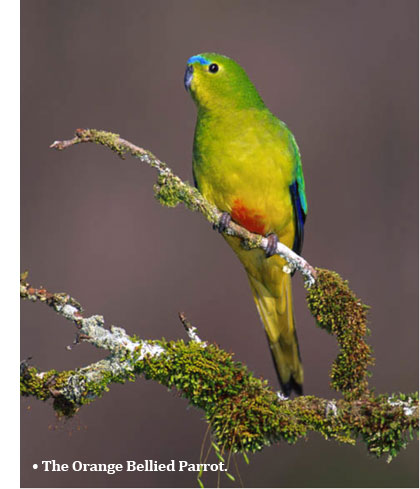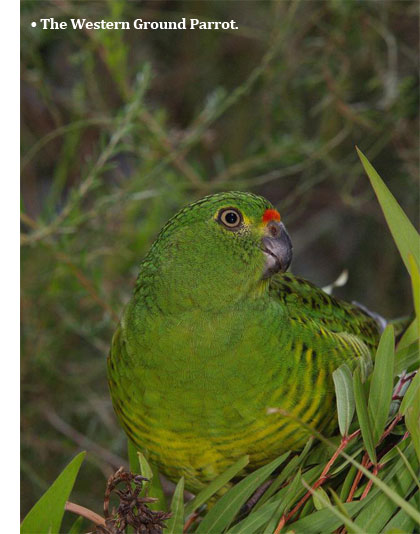The Federal Environment Minister Greg Hunt will unveil “Australia’s first national strategy for threatened species” at a summit in Melbourne later today, along with new funding and a shortlist of the most at-risk bird species.
The plans have been cautiously welcomed by environmental groups, but they agree with Hunt that “we have to work harder” to turn back the nation’s shocking extinction rate.
As part of the announcement Hunt has unveiled a list of 12 Australian birds singled out for “priority action”. “I want to bring these birds back far enough from the brink to survive in the wild long-term,” Hunt said ahead of the summit yesterday.
The 12 birds, which are the frontrunners of a list of 20 birds to be decided after one year’s consultation with the community, include the Helmeted Honeyeater, Hooded Plover, Eastern Bristlebird, Regent Honeyeater, Mallee Emu-Wren, Plains-Wanderer, Night Parrot, Alligator Rivers Yellow Chat, Norfolk Island's Green Parrot and Boobook owl.


“Two more – the Orange-Bellied Parrot and Western Ground Parrot – will benefit from emergency interventions,” Hunt said.
In 2010, research indicated that the critically endangered Orange-Bellied Parrot had dwindled to a wild population of just 50 birds, and Hunt said the new strategy for threatened species would include an “emergency intervention” to help secure its future.
The parrot, which at around 200mm long is slightly larger than a budgerigar, breeds in Tasmania but wings its way to the mainland in Winter to forage in coastal salt marshes.
The critically endangered Western Ground Parrot is even smaller, at around 135-145mm, and the green, black-flecked, Western Australian native has been pushed to less than 140 individuals.
Hunt said the government is “committed to improving their fortunes within five years,” and that he “wants future generations to enjoy the colour, movement and song [the threatened birds]bring to our lives”.
He said the threatened species plan “will clearly set out what will happen by when, turning good intentions into clear and measurable targets”.
“The recovery of 20 bird species by 2020 is one such target.”
New South Wales government projects to protect two of the 12 species will also get a boost of federal funds, with Hunt promising a cumulative $140,000 to help conserve the plains-wanderers of the Riverina and the south coast’s Hooded-Plover.
Hunt said “it is possible to recover birds at risk of extinction because we have access to high quality science and can act in partnership with the community and other governments,” but a number of environmental groups have used the Threatened Species Summit in Melbourne to sound the alarm over a proposed government reform.
The Commonwealth Government is in the process of establishing what it calls the ‘One-Stop Shop’, a plan which would see states take on powers currently exercised by the Commonwealth under the omnibus Environmental Protection & Biodiversity Conservation Act.
The Australian Environmental Defenders Office, a network of specialist public interest lawyers that has become endangered itself after the federal government stripped it of all funding, and a coalition of more than 40 environmental groups known as the Places You Love Alliance have said that the reform will diminish protections for the very threatened species Hunt is trying to protect.
Under the reform, there’s no legal mechanism to hold state governments to the same high standard laid out in federal law, which only kicks in when matters of national environmental significance are threatened, and states and territory conservation protections are less stringent across the board.
“The minister has done a good job of raising the issue of Australia’s threatened species declines, especially around the problem of feral cats, but if he’s serious about species protection he should not hand over national wildlife protection powers to the states,” said Darren Grover, Species Manager at the Australian arm of the World Wildlife Fund.
Grover said it was imperative that Minister Hunt provided the required funding for threatened species conservation work to take place, and that he directed that funding into the most effective projects.
“The need for targeted funding is made more critical by the fact that not one species has been removed from the Australian Government’s threatened species list as a result of recovery actions, while plenty of species have been added,” he said.
“In other words, Australian wildlife is under more pressure now than ever before.”
Donate To New Matilda
New Matilda is a small, independent media outlet. We survive through reader contributions, and never losing a lawsuit. If you got something from this article, giving something back helps us to continue speaking truth to power. Every little bit counts.



